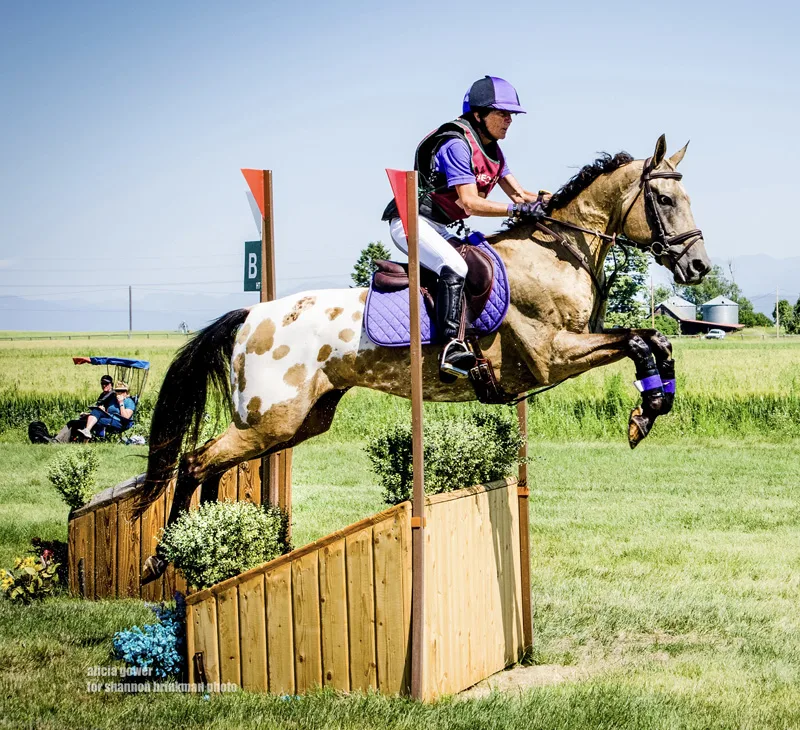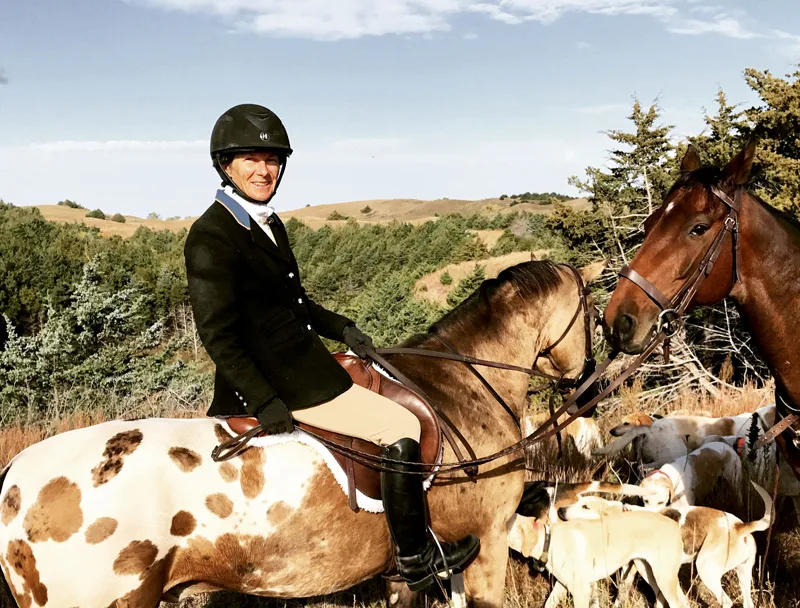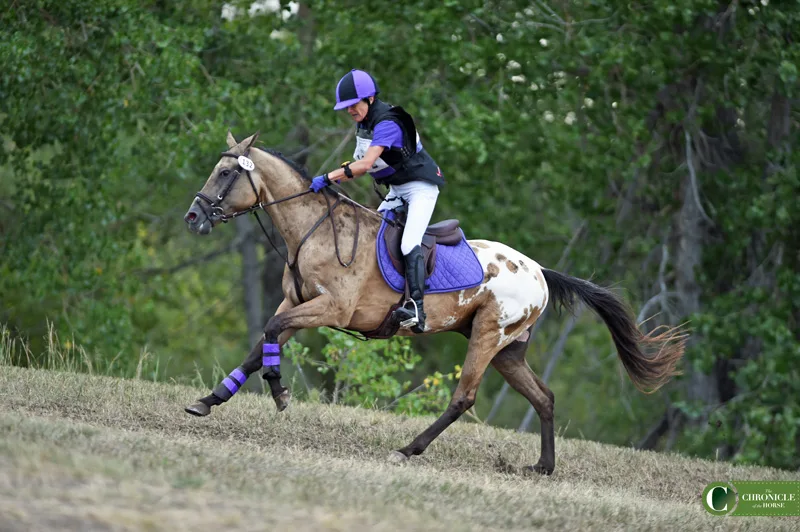“He’s never met a cross-country jump he doesn’t like,” was how Stephanie Caston described her latest project horse to her friend Mary Curran. With that sentence, Curran’s interest was piqued. At the time, she was eventing a horse that preferred dressage over galloping at solid obstacles.
“That’s so disheartening,” Curran said. “You’re leading after the first phase, and then you go out there, and your horse doesn’t want to go out there.”
When she saw Flying Colors, a 14.3-hand Akhal Teke-Appaloosa cross whose color is every bit as loud as you would imagine with that heritage, Curran knew she had to have him, and she purchased the gelding in 2015. His sire, Halhelooya, was an Akhal Teke-Appaloosa who came from the Idaho-based Nez Perce tribe’s attempt to restore their horse breeding culture. His dam, Kyra, was a full Akhal Teke.

Mary Curran and her Akhal Teke-Appaloosa cross Flying Colors stand out in any crowd. Alicia Gower for Shannon Brinkman Photo
For the first two years that she owned him, Curran only foxhunted “Hendrix.” She is the membership chair for the North Hills Hunt in Omaha, Nebraska, and she rode Hendrix first flight.
“He’ll stand, but when he’s going he’s very, very forward,” Curran said. “He likes to be in the front. He’s probably not the best—he’s maybe a little too forward to be a great foxhunter, but it worked.”

In addition to eventing, Mary Curran foxhunts Flying Colors first flight with North Hills Hunt. Photo Courtesy Of Mary Curran
While he was good in the hunt field or schooling cross-country, Hendrix was difficult to jump in a ring. He raced around without much control, and Curran was told it wasn’t worth putting any more money into him. Undeterred, she sent Hendrix to professional eventer Meaghan Marinovich to see what she could do.
“She took him for a month and worked with him in a way where he still felt he was in charge,” Curran said. “Because you can’t tell these horses you’re boss. You can’t dominate them. They just get angry and rear up, or they get mean. So she worked with him so he could go forward. She rode him with a neck strap for like a month so that he didn’t have somebody grabbing him in the face.”
ADVERTISEMENT
Slowly they brought Hendrix around.
“He’s just like no other horse,” Curran said. “If you don’t know him you can’t get the bridle over his head. He doesn’t want anyone to touch his ears unless he knows you. He’s just quirky, which is part of this Akhal Teke breed. But he will go all day long. He’s such a confidence builder. I’m not afraid on cross-country until I think the horse is afraid. With him, you kind of control the chaos, and it’s so much fun.
Curran has learned that Akhal Tekes have some character traits in common. “They’re not spooky,” she said. “They’re forward horses. You’ve just got to channel the forward. You have to kind of ask them. They always say ask don’t demand, but this horse you can’t drill him. You have to take all of your emotion away when you’re working with them.”

Mary Curran and Flying Colors competed at the Nutrena USEA American Eventing Championships in 2018 and 2019. Kieran Paulsen Photo
Curran has competed the 13-year-old gelding through training level and plans to move up to preliminary soon. They won the 2017 Area IV training championships at Heritage Park Horse Trials (Kansas) at their second outing at the level and have competed at two Nutrena USEA American Eventing Championships, though their last attempt ended early.
Curran is a good sport about it though. “I was focused on, ‘Let’s make time, let’s make time,’ and he went over the jump before the water and stopped right at the water,” she explained. “I have a picture of me with my boots up in the air, and he’s like peering down into the water looking at me. So that was probably the low point, but it was a classic. It was totally my fault. He would’ve gone if he’d been ridden right. You just can’t run horses at things. I got what I asked for.”
Curran, 63, is retired from working as part of a marketing group for Marriott International, where she helped design their rewards program. She started riding after college and broke into foxhunting when they moved to Earlham, Iowa, for her husband’s job 29 years ago. She began eventing in 1999, which she admitted seemed tame (and definitely more structured) compared to foxhunting. After she retired in 2012, Curran committed to becoming a better rider.
“I got really focused on how educated I could get,” she said. “I’ve taken tons of lessons, gone to clinics; I read. So that’s been my retirement passion is learning. Hendrix was perfect for that because he was a challenge. He wasn’t a push-button horse.”














